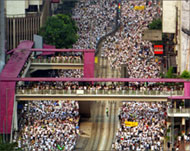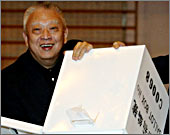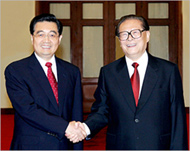Hong Kong chief executive ‘quits’
Hong Kong’s Chief Executive Tung Chee-hwa, whose unpopular leadership led to pro-democracy protests in the city, has resigned, according to sources close to the government and Beijing.

A source close to Hong Kong’s government, who declined to be identified, told Reuters on Wednesday that Chinese leaders in Beijing accepted Tung’s resignation last Saturday.
Tung’s move comes just weeks after he was publicly reprimanded by Chinese President Hu Jintao for poor performance over the past seven years.
Another source close to Beijing told Reuters that Chinese leaders had already agreed to Tung stepping down but he would only formally resign after being made vice-chairman of a top advisory body to China’s parliament, a promotion Tung is almost certain to get over the next 10 days.
Citing unidentified sources, Hong Kong newspapers reported Tung’s right-hand man, Chief Secretary Donald Tsang, would be made acting chief executive after Tung steps down.
Kept guessing
Asked to confirm if Tung had stepped down, a government spokesman said: “We don’t comment on speculation.”
Tung also kept people guessing. “I know you are concerned about many questions. I will reply at an appropriate time,” he said after arriving in Beijing for a meeting of the Chinese parliament’s top advisory body.
 |
|
The territory was rocked by huge |
The Standard newspaper said Tung handed in his resignation before the Chinese New Year, which started on 9 February, adding it was accepted after an emergency meeting of the politburo.
Tung, 67, told top Chinese officials that his health had been deteriorating, the newspaper said.
Rumours of his departure have swirled since Tung was made a member of the Chinese People’s Political Consultative Conference on Monday, which analysts saw as a precursor to being elevated to vice-chairman of the body.
Such a promotion would pave the way for a graceful exit for Tung and save face for Beijing, which has often had to defend the increasingly unpopular leader handpicked by the mainland’s leadership, analysts said.
Stormy tenure
Tung, a businessman with little political experience, was chosen by Beijing to be Hong Kong’s first chief executive after Britain returned the colony to Chinese rule in 1997.
But the former shipping tycoon’s tenure has been stormy, marked by major policy gaffes, resignations and scandals involving key lieutenants and three recessions.
 |
|
Hong Kong’s democrats have |
Widespread anger with Tung’s leadership spurred growing calls for full voting rights and massive street protests, alarming communist Beijing, who feared it could lose control of the city.
But calls for more democracy have eased since last April, when Beijing flatly rejected universal suffrage for the territory for at least the next few years. A recent protest drew only a few thousand people compared with half million who
took to the streets for rallies in 2003 and 2004.
Democrats who have long called for Tung to quit had mixed feelings about the news of the resignation, speculating that it could be a ploy by Beijing to tighten its grip on the city that was promised a high degree of autonomy when it returned to Chinese rule.
It is not clear if any replacement would merely serve out the rest of Tung’s term, which ends in mid-2007, or be confirmed by a Beijing-backed electoral college to take charge for a full 5-year term.
Conspiracy theory
Some political analysts say the latter is likely and that Beijing may have crafted the timing of Tung’s departure and the ascendance of Tsang, who is well liked, to stave off demands from the pro-democracy camp to participate in the electoral process.
 |
|
Political succession in China may |
Democracy activists are clamouring for more voting rights from as soon as 2007, something observers say Beijing is unwilling to give. Having Tsang in office until 2010 pushes back the need for any decision, they said.
“The conspiracy theory is sure to be accepted by many people,” Anthony Cheung, a professor at the Department of Public and Social Administration at City University, said.
Diplomats in Beijing said they were surprised by the reports of Tung’s resignation, saying sacking him was tantamount to China admitting that its choice of leader was wrong.
“The degree of instability that it threatens is something that traditionally China tries to avoid,” one diplomat said.
Some analysts noted Tung was the choice of former president Jiang Zemin, but may not have had the approval of current leaders President Hu and Premier Wen Jiabao, who took control in 2002.